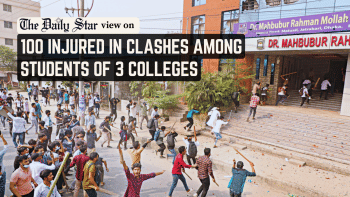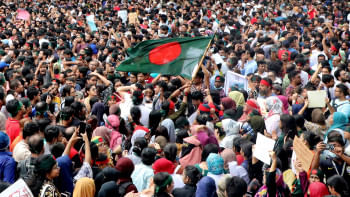Amid rising unrest, we must give unity a chance

We welcome the call for national unity amid rising tensions over seemingly unconnected reasons in different parts of the country. Both Chief Adviser Professor Muhammad Yunus and top BNP leaders have underscored the importance of peace and unity as the nation grapples with post-uprising challenges. At a recent meeting, Prof Yunus has emphasised the need to de-escalate tensions across societal divides, while BNP Secretary General Mirza Fakhrul Islam Alamgir called for dialogue with political parties to bridge divisions and build unity. Jamaat-e-Islami also supported the call for national unity.
However, unity is easier sought than achieved, as it requires decisive action, collective resolve and vigilance, a commitment to addressing the underlying causes of present unrest, and a certain bit of willingness to make concessions from all stakeholders.
While remnants of the ousted regime may be partly to blame for the recent turbulence, the alarming frequency of disruptions suggests deeper fissures within our society. In recent weeks, we have seen attacks and hostile mobilisations targeting media houses as well as violent clashes among college students. On Tuesday, unrest surrounding the arrest of a former ISKCON leader resulted in the brutal killing of a lawyer. Frequent public demonstrations by various groups, often leading to public disorder, have also become routine. Though these incidents may appear isolated, they form part of a broader pattern of instability following August 5.
The newfound freedom of expression under the interim government—while commendable—has also become a double-edged sword thanks to minimal oversight, creating a fertile ground for propaganda, hate speech, and rumours. Some are openly advocating destructive action, while others are sowing division under the guise of activism. These digital battlegrounds are making conflicts more likely and resolutions more elusive.
While the uprising reignited hopes for democracy, it also exposed the fragility of our sociopolitical fabric, with dissent and disillusionments festering in various quarters. The question is, if the accomplices of the fallen regime are indeed weaponising these divisions, why haven't they been conclusively identified yet? Or are there other forces also at play?
Adding fuel to this fire is the unchecked spread of incendiary narratives on social media. The newfound freedom of expression under the interim government—while commendable—has also become a double-edged sword thanks to minimal oversight, creating a fertile ground for propaganda, hate speech, and rumours. Some are openly advocating destructive action, while others are sowing division under the guise of activism. These digital battlegrounds are making conflicts more likely and resolutions more elusive. Compounding this issue is a perception among many that they can disrupt public life or destroy public properties without consequence, taking advantage of the fluid security situation.
So, how can we navigate these complex challenges to achieve peace and unity? Dialogue, as BNP has recommended, is indeed essential, not just between the government and political parties but also among various sociopolitical groups with competing interests. But for the sake of national interest, all must be sincere so that their interests are aligned with the common goal of peace. That said, dialogue alone is not enough.
The authorities must prioritise enhancing law enforcement, ensuring that laws are enforced strictly and impartially to deter and punish those inciting violence. Misuse of freedom of expression, especially online, must also be addressed carefully but firmly to curb the spread of hate and misinformation. At the same time, the call for a Truth and Peace Commission deserves serious consideration. Such a commission could play a pivotal role in rebuilding trust, fostering reconciliation, and promoting restorative justice.
The challenges we face today require us all to act responsibly and judiciously. A failure to do so risks undermining the gains of the uprising achieved through so much sacrifice and struggle.


 For all latest news, follow The Daily Star's Google News channel.
For all latest news, follow The Daily Star's Google News channel. 












Comments